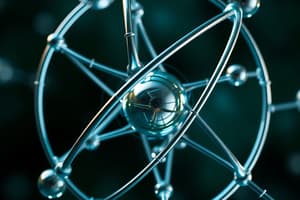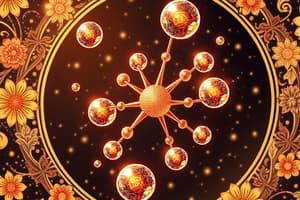Podcast
Questions and Answers
What is matter in chemistry?
What is matter in chemistry?
Matter refers to anything that has mass and takes up space.
Define elements in chemistry.
Define elements in chemistry.
Elements are pure chemical substances made up of only one type of atom.
What are compounds?
What are compounds?
Compounds are formed when two or more different elements bond together.
What are atoms in chemistry?
What are atoms in chemistry?
Give an example of a compound and how it forms.
Give an example of a compound and how it forms.
What is the main difference between covalent and ionic bonds?
What is the main difference between covalent and ionic bonds?
How do reaction rates depend on factors such as temperature, concentration, catalyst presence, and activation energies?
How do reaction rates depend on factors such as temperature, concentration, catalyst presence, and activation energies?
What distinguishes inorganic chemistry from organic chemistry in terms of focus?
What distinguishes inorganic chemistry from organic chemistry in terms of focus?
Why does carbon play a central role in most organic reactions?
Why does carbon play a central role in most organic reactions?
How does quantitative analysis in chemistry differ from qualitative descriptions, and why is it important?
How does quantitative analysis in chemistry differ from qualitative descriptions, and why is it important?
Flashcards are hidden until you start studying
Study Notes
Chemistry: Understanding Matter and Its Transformations
Chemistry is more than just mixing chemicals together; it's the study of matter, how it behaves, interacts, and transforms. This fascinating realm reveals the secrets behind household items, pharmaceuticals, food, energy production—even our own biology! Let's dive into some essential concepts and applications of chemistry.
Matter: A fundamental concept in chemistry, matter refers to anything that has mass and takes up space — essentially, everything around us. Matter can exist in three states under ordinary conditions: solid, liquid, or gas. But chemists also know that matter comes with its share of surprises, like plasma and Bose-Einstein condensates!
Elements: These are pure chemical substances made up only of one type of atom. There are over 118 known elements, including familiar ones such as hydrogen, oxygen, carbon, nitrogen, calcium, iron, sodium, etc..
Compounds: When two or more different elements bond together, they form compounds. Compound formation leads to new properties and sometimes entirely new materials. For instance, when you combine hydrogen and oxygen gases, water forms, which isn't found on Earth in its elemental state.
Atoms: Tiny building blocks that make up all matter, atoms consist of a nucleus surrounded by electrons orbiting around it. Atomic structure explains why different elements exhibit unique behaviors and offer insight into their interactions with each other.
Bonding: Atoms bond due to mutual attraction between their positively charged nuclei and negatively charged electron clouds. Covalent bonds involve shared pairs of electrons, while ionic bonds occur when electrons transfer from one atom to another (resulting in oppositely charged ions).
Reactions: Involve breaking existing chemical bonds and forming new ones. Reaction rates depend upon factors like temperature, concentration, catalyst presence, and activation energies.
Inorganic vs Organic Chemistry: The former deals primarily with nonliving systems formed by inorganic molecules, whereas organic chemistry focuses on living organisms and those synthetic structures derived thereof. Carbon plays a central role in most organic reactions because of its ability to form large chains through covalent bonds.
Quantitative Analysis: Chemistry extends beyond qualitative descriptions to quantifying amounts of reactants, products, concentrations, reaction rates, and equilibrium constants. Quantitative analysis provides crucial information used in applications ranging from environmental monitoring to material synthesis.
Lastly, let's mention applications, where chemistry serves humanity in numerous ways. From drug discovery and pharmacotherapy to materials science and computational chemistry, this subject offers countless opportunities to improve everyday life. So next time you look at your smartphone, think about the battery's electrode materials developed using sophisticated electrochemical processes.
With such vastness and depth, it's evident that understanding chemistry opens doors to many exciting fields waiting to be explored further. So keep learning, asking questions, and embrace the beauty of how matter works and evolves!
Studying That Suits You
Use AI to generate personalized quizzes and flashcards to suit your learning preferences.





